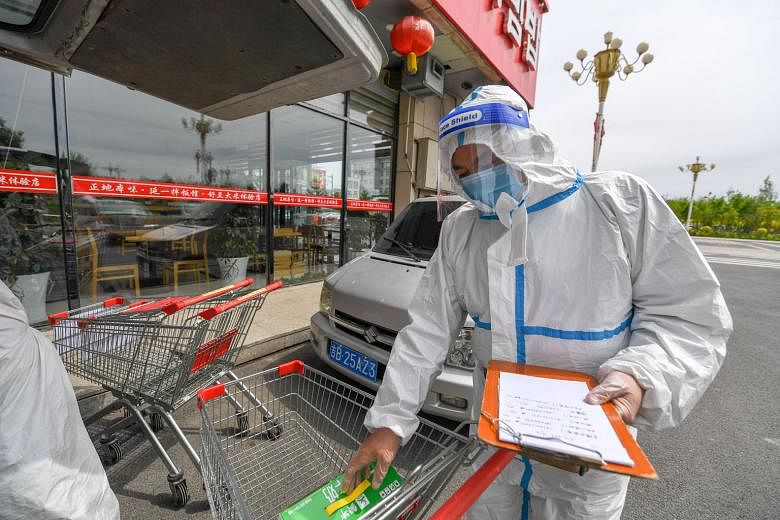JILIN • In Shulan, a city in China's north-east, the streets are eerily quiet, devoid of taxis and buses.
Apartment complexes have been sealed off, confining residents inside. Teams of government workers go door to door rounding up sick people as part of what they call a "wartime" campaign.
As the Chinese authorities confront scattered outbreaks of the coronavirus in the country's north-east, they are turning to many of the same strict lockdown measures that were a hallmark of the effort four months ago to stamp out the virus infections in the central city of Wuhan.
Residents described the atmosphere as tense.
Ms Li Ping, who works at a real estate company in Shulan which has a population of 600,000, stocked up on meat, eggs and noodles as she prepared for the lockdown.
"The government's controls now are very strict," she said.
"As long as we obey and not go out, it will be all right."
The forceful response reflects fears among China's leaders about the potential for a fresh wave of infections as factories, schools and restaurants reopen across much of the country and the government touts its success in fighting the virus on the global stage.
It also offers a preview of what governments around the world will likely face in the coming months as they work to restart their own economies.
The latest outbreak is concentrated in Jilin, a north-eastern province of 27 million people that sits near China's borders with Russia and North Korea.
Jilin has reported a small outbreak of about 130 cases and two deaths, but experts in the province have warned of the threat of a "big explosion".
Officials have already mobilised police and Communist Party groups to make sure residents comply with the lockdown.
Tens of thousands of people are being tested for the virus and thousands have been rounded up into hospitals for quarantine.
The central government has signalled its displeasure about the outbreak, dismissing five local officials and sending top leaders to the province to conduct inspections.
The authorities have also imposed a lockdown on parts of Jilin city, a manufacturing base, bringing factories and street activities to a standstill. In some areas, residents are allowed to leave their homes only once every two days, and for a maximum of two hours, to shop for groceries.
The strictest measures are probably affecting more than 200,000 people in the city.
"We are doing what is necessary to control and prevent the disease, and to isolate those who need to be isolated," said government worker Song Jing, who is helping to organise widespread testing for residents.
The outbreak points to the persistence of the coronavirus in China despite the punishing restrictions imposed to contain it, including a 76-day lockdown in Wuhan, the central city in Hubei where cases first emerged in December.
The coronavirus has killed at least 4,600 people in China, although that official count is considered an underestimate.
"The possibility of a second wave is clearly there," said Professor David Hui, director of the Stanley Ho Centre for Emerging Infectious Diseases at the Chinese University of Hong Kong. "China doesn't want to take any chances."
The ruling Communist Party's swift use of heavy-handed lockdown measures in Jilin also shows its resolve to declare victory in what President Xi Jinping has described as a "people's war" against the virus.
Officials are also working to contain small outbreaks elsewhere, including in Wuhan again, where the government is leading a campaign to test all of the city's 11 million residents after a smattering of new cases.
The coronavirus outbreak in Jilin has unnerved the public in part because the authorities have struggled to trace its origins.
Officials have tied many cases in the north-east to Chinese nationals who had recently returned from Russia. But many of the recent cases involve people who had not travelled outside the country.
One of the first reported clusters in Jilin was traced to a 45-year-old woman in Shulan who washed clothes at a police bureau and had not been abroad recently.
Around a dozen other cases were later linked to the woman.
Elsewhere, officials found that a man in Jilin city infected with the coronavirus had attended a big wedding early this month, raising fears of a bigger outbreak.
Adding to the difficulties, Chinese medical experts say the virus is displaying slightly different characteristics in Jilin, as well as in other north-eastern provinces where cases have recently appeared, including Heilongjiang.
Patients are also taking longer than the typical one to two weeks to show symptoms of the illness after being infected, an expert with the National Health Commission, Dr Qiu Haibo, told the state-run broadcaster this week, and they are carrying the virus for a longer period of time.
NYTIMES











